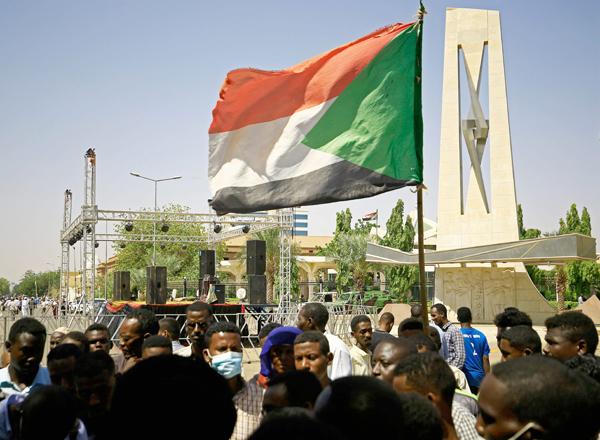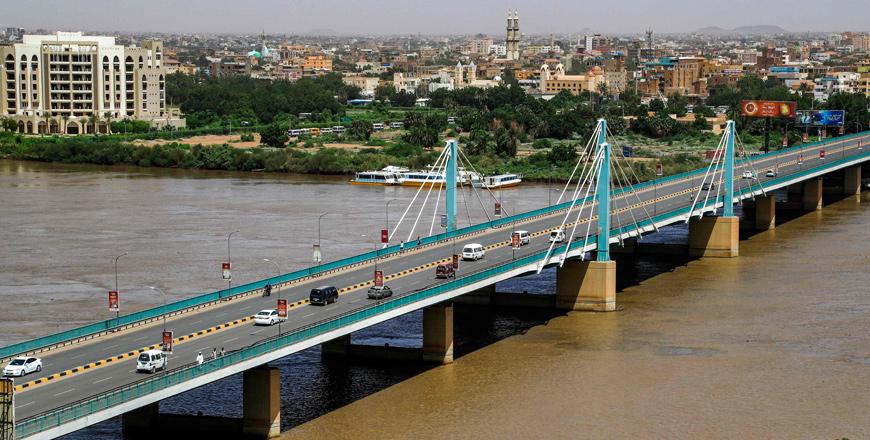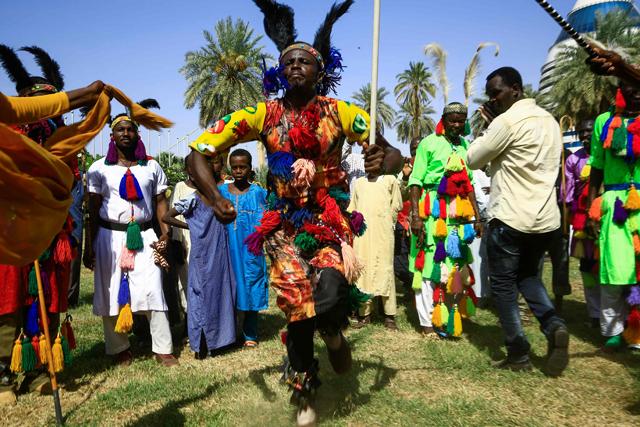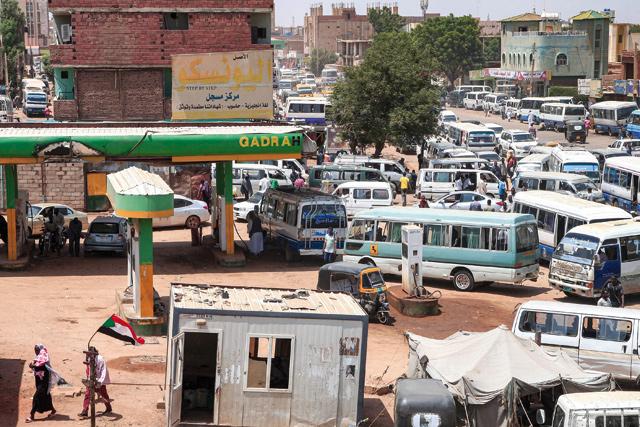You are here
Timeline: Sudan since the fall of Bashir
By AFP - Oct 18,2021 - Last updated at Oct 18,2021

A protester holds a national flag during a sit-in demanding the dissolution of Sudan’s post-dictatorship interim government, outside the presidential palace in central Khartoum on Monday (AFP photo)
KHARTOUM — Hundreds of pro-military protesters have rallied for days in Sudan, exacerbating what Prime Minister Abdalla Hamdok dubbed the “most dangerous crisis” so far in a precarious transition from decades of dictatorship.
Here is a recap of events since autocratic president Omar Al Bashir was toppled over two years ago:
2019: Bashir ousted
On April 11, 2019, four months after mass protests sparked by a hike in bread prices spiral into demands for wholesale reform, Sudan’s army removes Bashir from power.
He is replaced by a transitional military government.
Thousands camp in front of army headquarters demanding civilian rule.
Talks between the generals and protest leaders break down.
Bloody crackdown
Armed men move in on the protest camp on June 3 and dozens are killed in a days-long crackdown.
A feared paramilitary group that sprang from the notorious Janjaweed militia, accused of war crimes in the 2003 Darfur conflict, is blamed for the violence, but rejects allegations it was involved.
Power-sharing
After the African Union intervenes, civilian and military factions agree to share power in a three-year transition to full civilian rule.
On August 17, a “constitutional declaration” is signed and a sovereign council comprised of leading military and civilian figures is formed three days later.
In October, the government and rebel groups who had fought Bashir’s iron-fisted rule for decades agree to a “permanent ceasefire” in the country’s three war zones.
Bashir convicted
On December 14, Bashir is convicted of corruption and sentenced to two years in a correctional centre.
The toppled autocrat has long been wanted by the International Criminal Court (ICC) in The Hague over charges of genocide, war crimes and crimes against humanity in the 2003 Darfur conflict in which 300,000 people were killed.
A Khartoum prosecutor rejects extradition as not “necessary”.
2020: Unrest spreads
On March 9, 2020 Hamdok survives an assassination attempt which many see as a bid to derail the transition.
Inflation skyrockets in April to 99 per cent and higher, with food prices soaring after borders are closed to tackle the coronavirus pandemic.
On June 30, street demonstrations reiterate demands for justice for people killed under Bashir and during the protests of recent years.
Bashir tried for coup
On July 21, 2020, Bashir goes on trial in Khartoum for the 1989 coup that brought him to power.
The government announces it will devalue the currency in a bid to curb black market activity as it struggles with an “economic emergency”.
Peace deal
In October, Sudan signs a landmark peace deal with an alliance of rebel groups.
Two key rebel groups refuse to sign and tribes in Sudan’s east also oppose it, saying it overlooks them.
Also in October, Sudan agrees to establish diplomatic ties with Israel, in what is seen as a quid pro quo for the US to remove the country from its State Sponsors of Terrorism list in December.
Ethiopia tensions
In November 2020, conflict breaks out in Ethiopia’s northern Tigray region, sending tens of thousands of refugees into Sudan.
The fighting rekindles a decades-old dispute between Sudan and Ethiopia over the fertile border region of A Fashaqa. Khartoum sends troops to secure the area.
The two countries are also at odds over the Grand Ethiopian Renaissance Dam, as Sudan — along with Egypt — are both downstream from Ethiopia on the Nile.
2021: Fragile government
Sudan in February announces a new Cabinet including seven ministers from ex-rebel groups.
In June, Hamdok warns of fractures within the civilian alliance which spearheaded the anti-Bashir protests.
He also points to worrying splits within the main security blocs.
Economic mire
Sudan embarks on tough economic reforms to qualify for international debt relief.
In February, it launches a managed float of the Sudanese pound, and in June it scraps subsidies on petrol and diesel.
The measures further hit citizens in the pocket and spark sporadic protests, but also bring long-sought debt forgiveness and unlock loans.
Pledge to
extradite Bashir
On August 11, Sudan’s cabinet says it has agreed to hand Bashir over to the ICC. The decision, however, awaits ratification by the ruling civilian-military sovereign council.
Failed coup, protests
Protests in eastern Sudan block trade through the key hub of Port Sudan from September into October.
Khartoum announces on September 21 that it has thwarted a coup attempt by civilian and military plotters linked to Bashir’s ousted regime.
Hamdok says the attempt highlights the urgent need for security reforms.
Hundreds protest in Khartoum on October 16 and 17 to demand a military government, ostensibly at the behest of a splinter faction of the main civilian protest bloc.
But critics allege the protests are being stage managed by members of the security forces, including sympathisers with the former regime.
Related Articles
KHARTOUM — Sudan's fragile transitional government said it foiled an attempted coup early Tuesday involving military officers and civilians
KHARTOUM — Several political factions including ex-rebel groups announced on Saturday the formation of an alliance separate from Sudan’s mai
The country is led by a civilian-military administration under an August 2019 power-sharing deal. It was signed months after Bashir’s ouster by the military following mass protests against his iron-fisted three decades in power.


















